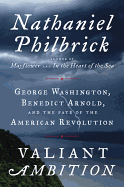
The name "Benedict Arnold" is synonymous with "traitor" today, but it wasn't always. Before Arnold began selling crucial information to the British military during the American Revolution, he was a charismatic general, a colleague of George Washington and a staunch believer in the colonists' cause. Nathaniel Philbrick delves into the uncertain early years of the war and traces Arnold's journey from hero to turncoat in Valiant Ambition.
Philbrick is known for his vivid, compelling explorations of crucial episodes in American history (Bunker Hill; In the Heart of the Sea). Valiant Ambition plunges readers into the chaos of a new, untried country, whose military leaders struggled to unite the groups of inexperienced militiamen under their command. As the colonial army battled the British army in the dense forests of upstate New York, the Continental Congress remained in Philadelphia, arguing about finance, foreign policy and other issues. Bold and impatient, Arnold longed to capitalize on his past battlefield successes, but grew frustrated when he was passed over repeatedly for promotion.
After more than 200 years of telling and retelling, Arnold's story and the players in it are often reduced to simple, almost mythical archetypes. But Philbrick treats his subjects with respect, painting complex portraits of historical figures who were real--and flawed--people. (Philbrick's depiction of the Continental Congress as "stuck in the old familiar rut of partisanship and indecision" may ring uncomfortably familiar today.) Though Arnold did in fact betray his comrades, Philbrick's account sheds new light on his motivations and the struggles faced by the leaders and citizens of a brand-new nation. --Katie Noah Gibson, blogger at Cakes, Tea and Dreams

